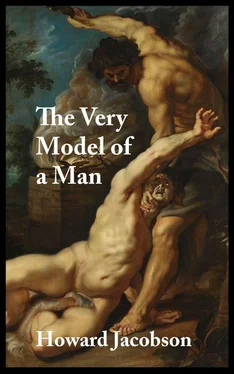And I wasn’t the one doing all the killing.
You have the right to make your own choice, I told Abel, but you oughtn’t to be calling one thing another.
He shook his head and sighed one of Eve’s dismissive sighs — meaning, I know none of this, and will have none of this. Perhaps a sigh is not the word. It was more a tut, a tst, an intake rather than an expulsion of air, a toothy click of habituated scorn which my mother had stealthily tricked us all into learning — a withholding of approbation from a universe that had withheld everything from her. There were sweltering, ungenerous nights when, as a family, we clicked contemptuously at one another, and the only sound to be heard above the hysteria of the hyenas and the chomping jaws of crocodiles was the uninterrupted tst-tst-tst-tst of human contrariety.
Don’t pretend you don’t know what I’m talking about, I said. One thing is not another. You understand that perfectly well when it comes to what you cook up on your holy altar. You don’t lay a thigh of calf alongside a rump of lamb. You don’t seethe kid in its own mother’s milk. Habdalah forbids it. The law of separation says that one thing is not another. Admit that you are butchering not to celebrate life but because you are in the service of death.
I make an offering to express my thanks, he said.
Why can’t you express your thanks some other way?
Such as?
Such as by begetting instead of killing. You could twist flowers between your goats’ horns and encourage them to increase.
They don’t need encouragement.
They don’t need depletion.
He came very close to tutting me. Then wiped his eyes instead. I felt sure that underneath the smoke his usual pallor had paled a little more. Although he had set his jaw, his lips would not stay together. Although we never argued, we were arguing.
I don’t believe, he finally calmed himself to say, that you are genuinely concerned for my flock. The welfare of my sheep is not what motivates you.
What does?
He didn’t want to say. He would have liked to leave it at that. We disagreed. That was all. His mouth was so far out of his control that he all at once reminded me of the mannequins my father had manufactured years before, to win back my mother from the shekinah.
I asked again. What does? What motivates me?
He still didn’t want to say.
I arched an eyebrow. Small gestures can be as weapons between brothers. He choked me with his white, throbbing lips — those two recalcitrant slugs that could never bring themselves to mate. And I drew blood from him with my quizzing eyebrow.
Very well. All right. I’d asked for it…
Greed and envy, he said in a broken voice. And then, more sonorously — Envy and greed.
Greed? (I never saw the point of denying envy. One might as well have denied one breathed.) But greed! What am I greedy with? I asked.
How spiteful he suddenly looked. You are greedy, he said, with whatever’s yours.
I laughed. What — my bits of grass and grain? My first-fruits, as our blazing angel of the personal enigma grandly called them? My wheat, my barley, my grapes, my figs, my pomegranates, my olive oil and my honey? Do you suppose I hoard them?
You do not offer them.
Why would I?
As a token that you understand they are His.
If they are His, then He already has them.
He does not have them. He has given them to you.
In order that I should give them back to Him? Here is a fine giving, if the receiver must –
These things are gestural, Cain. The meaning is larger than the act.
Then why are you so punctilious in the act’s performance?
To show I value the meaning.
You mean, to show you value the meaning punctiliously.
He had been sharpening his knife on a whetstone the whole time we’d been arguing (except that we never argued), and now he drew the blade across the palm of his left hand. A faint line of red sprang up where it had been. He would sooner hurt himself, I thought, than hurt me.
Do you remember, I asked, how you used to spin shells?
He looked away. I must have too obviously signalled my intentions.
Do you remember, I went on, how you could never be drawn from them? No matter how late it was, or how tired you were, or how much damage you had done to your hands? You were punctilious in the act’s performance then. What underlying meaning was there? What lay beneath the act?
There was none, he said. Nothing did.
He was not as good an advocate for himself as I was for him. Of course there was an underlying meaning. He sat in the sand with his shells spinning and his fingers bleeding and the tears running down his baby-blue-veined cheeks because all in all that was a better way of consuming the time than any we’d been able to teach him. He had descended into himself early. I did not rule it out as a possibility that he had opted for his own company (over all others that were offering) in the opening seconds of his conscious life. He tried the muscle first of one misted gelatinous window, and then the other, and saw… what? Saw me, flaming against his intrusion; saw my father, not knowing where to put his hands or how to frame the words or gestures that denoted welcome; saw — no, sucked upon my mother, and drank therefrom the alternating sweets and bitters of every woman’s milk, the surges of wild pride in her instrumentality, the acrid loathing of having been fashioned functional; saw, and heard, the discomposure of the heavens, thrown into havoc by the fear that flesh might again prove devilish or, worse, angelic — saw, sucked, heard all this and plumped without further ado (as who would not?) for an inner rather than an outer life.
He had been absent from the start, that was all I wanted him to admit, no criticism implied. He had been absent from the moment he had decided against being present, and he was still absent, tending his altar, now. We were in a disagreement only over words. I called it absence. He called it worship.
In that case, I said, if the ritual you performed with the shells had no underlying meaning, was performed in the name of nothing but itself, and yet was performed so religiously, does that not lead you to wonder whether you aren’t an incorrigible ritualist by nature and would do just as fervently by a pyramid of stones as you do by God, were the stones only to speak out and ask it of you?
He was very angry with me. Posed. Pretty. Sooty. A morsel for a monarch. A Giftling for a God.
You see resemblances where there are none, he said.
Resemblances are all we have to go on, I replied. (For I was young and mad for metaphor.)
Shells are not God, he said.
Then I am holier than you. I think God is everything.
And therefore nothing?
That must follow, I agreed. The earth was without form, and void, when He created it. Therefore He must have had say over the void.
Word games.
Words, too, are among the little that we have, I said. So why not play with them? What else are they for? You refuse the game only because you fear it will demean the object of your ritual. But you’re wrong. My reasoning does not lower God, it elevates the shells.
Yes, but to the level of what? Elevate everything and you eliminate all difference between high and low.
What then? Is this not the last goal of worship — that we all aspire and ultimately rise?
If there were nothing base –
Aha, I said. I see, I said. If there were nothing base, there would be nothing noble. So it is still you who passes sentence on what is low in order to protect the status of what is high. You are the one with the poor opinion of the shells, not me.
Why do you keep returning to my shells? To remind me of the difference in our ages?
I couldn’t look at him. His face had become pointed, almost like a snout. An animal face, shaped to sniff out insults to itself in loving conversation. I said, I recall the hours you spent spinning because I am fond of the recollection. It also reminds me of how you waste your mornings now. I’m glad you are able to go on abstracting yourself from matters with which you would rather not engage. I don’t blame you. I wish I could. But don’t speak to me of your thankful spirit or my greed. Compulsive and repetitive behaviour has nothing to do with vice or virtue.
Читать дальше











